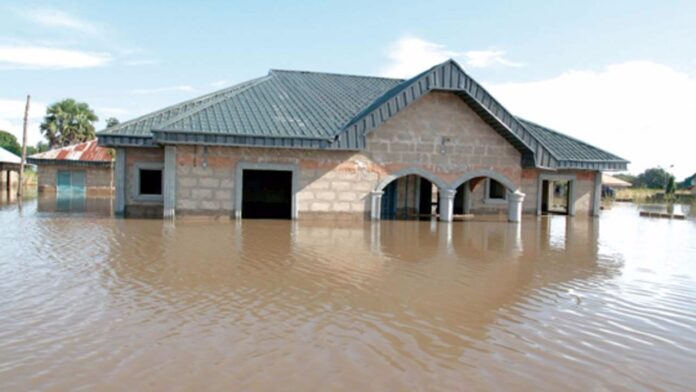A recent study by Angmor, G. D. M. (2024) titled “Climate Change Flooding and Diseases in Sub Sahara Africa: Trends and Adaptions Strategies (A Review)” published in Korean Journal of Physiology and Pharmacology, shows that climate change in Sub-Saharan Africa is leading to increased temperatures, shifts in precipitation patterns, and more extreme weather events.
“
Climate change in Sub-Saharan Africa is leading to increased temperatures and extreme weather events. -Angmor, G. D. M. (2024)
The research delves into the multifaceted challenges posed by climate change, flooding, and disease outbreaks within the context of Sub-Saharan Africa. The study meticulously examines the ramifications of climate change across Sub-Saharan Africa. It scrutinizes the shifting temperatures, alterations in precipitation patterns, and the surge in extreme weather phenomena. These factors collectively contribute to a heightened risk of flooding and the proliferation of diseases within the region. There is a stark illustration of how marginalized communities bear the brunt of these environmental shifts. Socio-economic inequalities are further exacerbated, emphasizing the urgent need for comprehensive adaptation strategies that account for the diverse needs of these vulnerable populations. The study critically assesses a spectrum of adaptation initiatives. These range from the implementation of early warning systems to sustainable water management practices and community-based health interventions. The emphasis lies on empowering communities to bolster their resilience in the face of environmental adversities. A holistic approach is advocated, one that amalgamates traditional wisdom with contemporary scientific methodologies. The importance of community engagement is underscored, alongside the recognition of indigenous knowledge systems. This integrated approach not only fosters sustainable development but also serves as a cornerstone for enhancing public health outcomes across the region.
How the Study was Conducted
The research utilized well-known databases like Google Scholar, JSTOR, Science Direct, and Research Gate. A customized search query was created to identify relevant studies. Titles and abstracts were scanned, followed by full-text assessments to filter out off-topic records. A total of 10 studies were included in the review after a rigorous selection process.This methodological approach ensures a thorough understanding of the complex issues related to climate change, flooding, and diseases in the region.
What the Authors Found
The author found that climate change in Sub-Saharan Africa is leading to increased temperatures, shifts in precipitation patterns, and more extreme weather events. These changes are causing more frequent and intense floods, which disrupt livelihoods and infrastructure, and create environments conducive to the spread of diseases.
Why is this Important
Human Impact: Climate change, flooding, and diseases directly affect human lives, livelihoods, and well-being. Understanding their interconnections allows us to develop targeted interventions to mitigate their impact.
Vulnerable Communities: Marginalized communities in Sub-Saharan Africa are disproportionately affected. By addressing these challenges, we can reduce disparities and promote social equity.
Resilience Building: The study emphasizes the need for adaptation strategies. Building resilience at local, national, and international levels is essential to cope with the changing climate and its consequences.
Global Health: Sub-Saharan Africa’s health is interconnected with global health. Addressing these issues contributes to global disease prevention and control.
What the Authors Recommend
The authors recommend several key strategies to address the challenges posed by climate change, flooding, and diseases in Sub-Saharan Africa
- Early Warning Systems: Implement robust early warning systems to predict extreme weather events, such as floods, and disseminate timely alerts to vulnerable communities. These systems can help reduce the impact of disasters.
- Sustainable Water Management: Enhance water resource management practices to mitigate the effects of flooding. This includes building reservoirs, improving irrigation techniques, and promoting water conservation.
- Community-Based Health Interventions: Engage local communities in health promotion and disease prevention. Community health workers can play a crucial role in educating people about hygiene, sanitation, and disease control.
- Integrated Approaches: Adopt an integrated approach that combines traditional knowledge with modern scientific methods. Collaborate across sectors, including health, agriculture, and disaster management, to develop holistic solutions.
- Capacity Building: Strengthen the capacity of health systems, disaster response teams, and community organizations. Training and resources are essential for effective adaptation.
In conclusion, the study sheds light on the interconnected challenges of climate change, flooding, and diseases in Sub-Saharan Africa, emphasizing the urgent need for comprehensive adaptation strategies. By addressing these issues, we can mitigate their impact on human lives, promote social equity, build resilience, and contribute to global health initiatives. Through collaborative efforts and integrated approaches, we can pave the way for sustainable development and improved well-being across the region.
















 The African Research (AR) Index is a comprehensive scholarly directory and database focused explicitly on journal publishers that publish and disseminate African research.
The African Research (AR) Index is a comprehensive scholarly directory and database focused explicitly on journal publishers that publish and disseminate African research.

